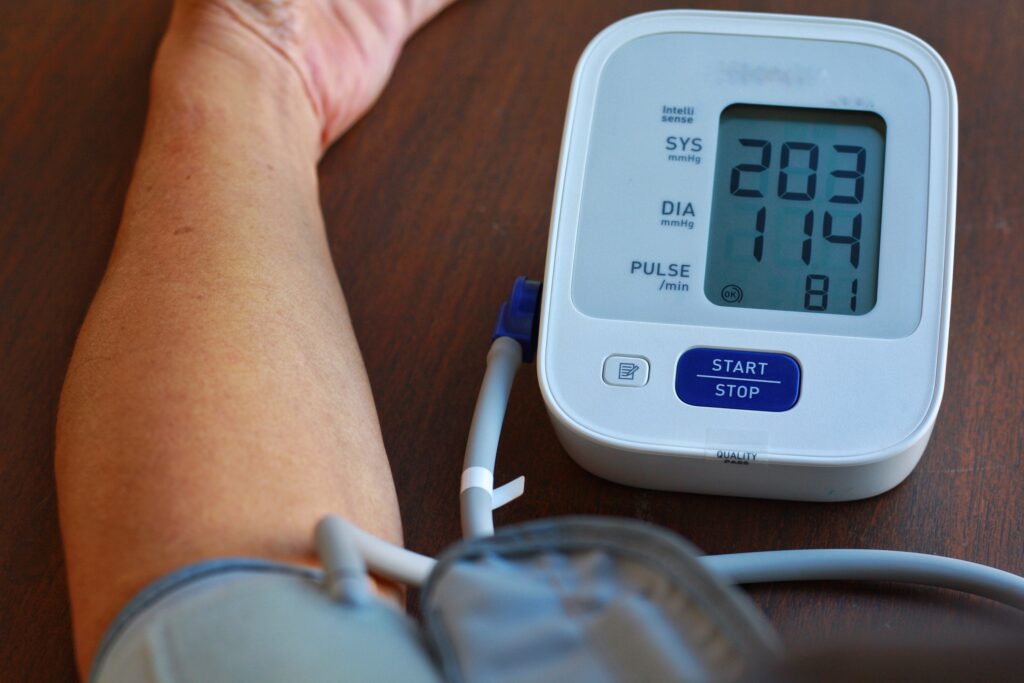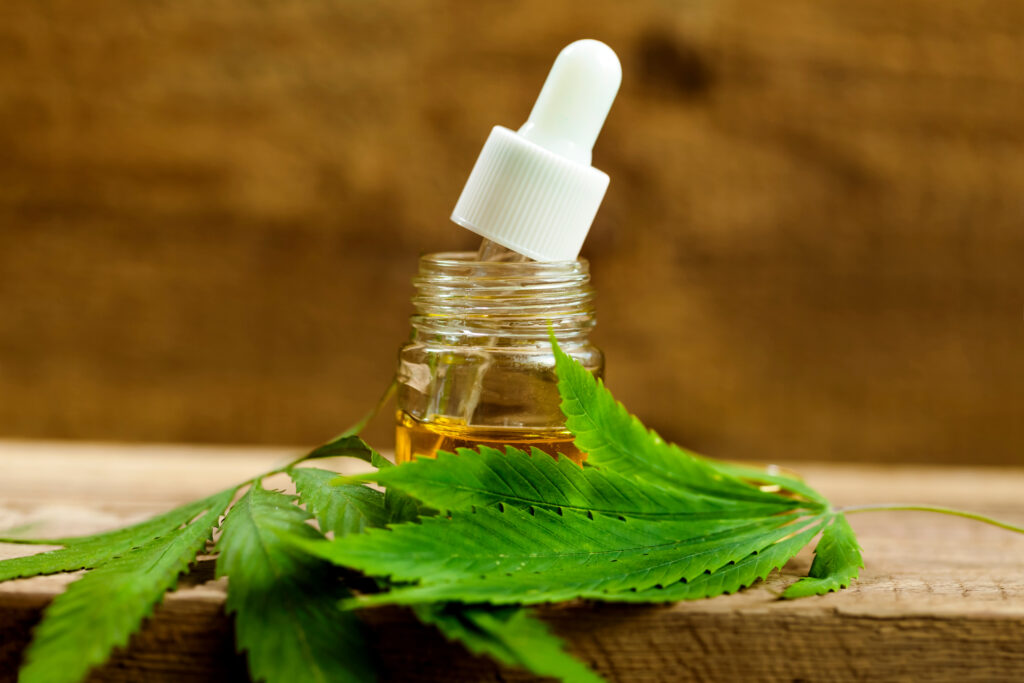Blood pressure allows physicians to measure the amount of force blood exerts against the inner walls of your blood vessels. It’s regulated by your body’s homeostatic mechanisms to ensure the pressure doesn’t become too high or too low.

When blood pressure becomes abnormal, it’s either too high (hypertension) or too low (hypotension). Individuals with blood pressure between 121/81 and 139/89 have pre-hypertension.
Lifestyle and genetics play a major role in blood pressure and cardiovascular health. Diet, weight, age, underlying health conditions, stress, and smoking all increase your risk of developing hypertension.
While hypotension is considered less dangerous than hypertension, it can cause dizziness and fainting. Hypotension is often chalked up to being a part of aging. Though, hypotension can also be linked to underlying health conditions, including hypothyroidism and malnutrition.
It has been said that individuals with heart conditions should avoid using cannabis, as it can cause a temporary rise in blood pressure. However, studies show after the initial rise in blood pressure, cannabis actually causes blood pressure to decrease.
Confusing, right? So, how does cannabis affect blood pressure? Does cannabis increase heart rate? After the initial effects wear off, can cannabis help decrease blood pressure?
How Cannabis Impacts Blood Pressure
Does marijuana give you high blood pressure? As mentioned above, cannabis can increase and decrease blood pressure. Cannabis also causes a temporary rise in heart rate when first inhaled.
In one clinical trial, participants ages 60 and up with hypertension were recruited to assess the effects of cannabis on blood pressure. Thirty-eight participants completed a 24-hour assessment. Twenty-six participants continued to use cannabis and completed the 3-month follow-up. Most participants used cannabis oil, while only four of them smoked cannabis.
During both the 24-hour assessment and 3-month follow-up, researchers observed significant reductions in both systolic and diastolic blood pressure.
Systolic pressure is the maximum force exerted during ventricular contraction (a.k.a. your heart beating). It is the number on top in a blood pressure reading.
Diastolic pressure is the lowest pressure in your arteries before the next ventricular contraction. “Systole” refers to periods of contraction, while “diastole” refers to periods of relaxation.
The reductions in systolic pressure after cannabis use were more prominent during the day, while the reductions in diastolic pressure were more prominent at night in this study.
“It seems there is a temporal relationship between cannabis administration and blood pressure,” the authors explain. “The most meaningful reduction in blood pressure values was 3 hours after cannabis administration.”
However, as the authors note, cannabis oil was the most common form of cannabis used during this study. It can take 1-2 hours to feel the effects of cannabinoids taken orally, and metabolism may take longer in older adults. This could explain why the most meaningful reductions in blood pressure occurred 3 hours after administration.
The authors also mention how previous studies have said there might be a dose-dependent relationship between cannabis and blood pressure. Moreover, previous literature has suggested lower doses of cannabis may increase blood pressure while higher doses decrease it. This was not observed during their study, though.
Other studies have mentioned that abruptly stopping cannabis after heavy use can cause significant increases in blood pressure, as much as a 22.8mmHG increase in systolic pressure and a 12.3mmHG increase in diastolic pressure.
If you have hypertension and decide to quit cannabis cold turkey, it’s imperative to closely monitor your blood pressure during the cessation period.
Can Cannabis Help with Hypertension?
Based on the study described above, it does appear that cannabis use can decrease blood pressure in older adults with hypertension. Cannabis temporarily increases blood pressure, but after the initial effects wear off, cannabis use is associated with decreases in systolic and diastolic blood pressure.
However, more studies need to be replicated with larger sample sizes and more diverse samples before any definitive conclusions can be drawn. If you have hypertension — or an underlying cardiovascular condition — monitor your blood pressure and speak with your doctor before using cannabis.
You can purchase at-home blood pressure monitors online or from your local pharmacy to monitor your blood pressure after using cannabis. You could buy an oximeter to measure your heart rate, as well.
Can CBD Lower Blood Pressure?

In a study on nine healthy male volunteers, the participants either received a single 600mg dose of CBD or a placebo.
The study found that CBD lowered resting blood pressure and “blunted the blood pressure response to stress.” CBD also decreased stroke volume (the amount of blood pumped from the heart’s left ventricle per beat) and increased heart rate.
While this study was very small-scale and only evaluated the effects of CBD after one dose, it does provide a good starting point for further research on CBD and cardiovascular health.
“Cannabidiol [CBD] is known to possess antioxidant and anti-inflammatory properties,” says an International Journal of Molecular Sciences review article. “Thus, it might have therapeutic potential in the treatment of different cardiovascular diseases, as the oxidative stress and inflammation are essential parts of their pathogenesis.”
Additionally, the review article explains that CBD’s anxiolytic (anxiety-reducing) properties could explain how CBD mitigates stress-induced increases in blood pressure.
Key Takeaways: Cannabis May Reduce Blood Pressure

The relationship between cannabis and blood pressure reduction is just now coming to light. Although cannabis use is associated with a temporary increase in blood pressure, cannabis may actually decrease blood pressure after the initial effects wear off.
Additionally, researchers believe CBD’s antioxidant, anti-inflammatory, and anxiolytic properties could display therapeutic potential for heart health. These properties are worth exploring further in future research, as well.
Regulating and monitoring your blood pressure is profoundly important for maintaining cardiovascular health. However, there are concerns about cannabis and cardiovascular risks that still need to be further researched.
Furthermore, abruptly stopping cannabis after heavy use is associated with significant increases in blood pressure. If you have hypertension and want to stop using cannabis, consult with your doctor about the best way to do it safely.
References
- Moini, J. (2019). Anatomy and Physiology for Health Professionals (3rd ed.). Jones & Bartlett Learning.
- Abuhasira, R., Haviv, Y. S., Leiba, M., Leiba, A., Ryvo, L., & Novack, V. (2021). Cannabis is associated with blood pressure reduction in older adults – A 24-hours ambulatory blood pressure monitoring study. European Journal of Internal Medicine, 86, 79–85. https://doi.org/10.1016/j.ejim.2021.01.005
- Vandrey, R., Umbricht, A., & Strain, E. C. (2011). Increased Blood Pressure After Abrupt Cessation of Daily Cannabis Use. Journal of Addiction Medicine, 5(1), 16–20. https://doi.org/10.1097/adm.0b013e3181d2b309
- Jadoon, K. A., Tan, G. D., & O’Sullivan, S. E. (2017). A single dose of cannabidiol reduces blood pressure in healthy volunteers in a randomized crossover study. JCI Insight, 2(12). https://doi.org/10.1172/jci.insight.93760
- Kicman, A., & Toczek, M. (2020). The Effects of Cannabidiol, a Non-Intoxicating Compound of Cannabis, on the Cardiovascular System in Health and Disease. International Journal of Molecular Sciences, 21(18), 6740. https://doi.org/10.3390/ijms21186740